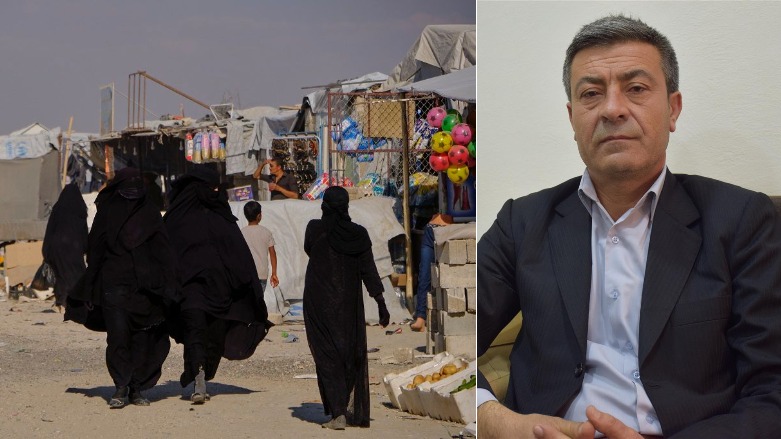A senior Syrian Kurdish official on Friday said that the international community should do more to help them to secure refugee camps in Syria.
ERBIL (Kurdistan 24) – Sheikhmous Ahmed, the head of the Autonomous Administration of North and East Syria (AANES) office for internally displaced persons (IDP) and refugees, told Kurdistan 24 that the international community should do more to secure the notorious al-Hol camp.
According to local data, at least 33 persons have been killed in the al-Hol camp—which hosts tens of thousands of Islamic State-affiliated women and children—in 2020.
Last Friday, a member of the Internal Security Forces (Asayish) was killed after a suspected Islamic State fighter blew himself up in the camp. The incident occurred as Asayish forces responded to the killing of two Iraqi refugees in the al-Hol.
Read More: SDF-linked police killed in clash with ISIS in Syria’s al-Hol camp
Ahmed said improving security and the humanitarian situation at the sprawling facility requires Iraqi refugees and Syrian IDPs to return to their homes. “Only the foreign (ISIS) families should stay, and the European Union should support us for the security.”
The AANES official stated that the international community should support the local Kurdish-led authorities to secure the notorious al-Hol camp.
According to UN data from July 2020, al-Hol held 65,406 people at the time. Of these, 47 percent were Iraqis (30,573), 38 percent Syrians (24,914), and 15 percent third-country nationals, the adults of which were mostly foreigners who traveled to Syria or Iraq to join the Islamic State (9,912).
“The camp is as big as a city population, and the Asayish cannot assist them. ISIS established an Islamic State in al-Hol camp,” Ahmed claimed, noting that the residents have their own courts. Islamic State affiliates “have their own forces inside the camp and kill people.”
“There is more support needed from the international community, Iraq, and the (US-led) Coalition to control the situation in the camp,” the official said.
He added that the international community must provide more support since the facility hosts 54 nationalities, with Iraqis being the largest component.
The Turkish invasion of Tal Abyad and Serekaniye in October 2019 made supporting al-Hol more difficult as more displaced people arrived, according to Ahmed. As a result, three new camps were opened, including one in Raqqa.
Around 125,000 Kurds displaced by the Turkish operation in Afrin between January and March 2018 live spread over five camps in the Shahba region in northern Aleppo.
“Their situation is complicated because they are surrounded by” the Syrian regime, Turkish forces, and Russian troops.
Read More: Blocked from humanitarian aid, Afrin Kurds experience hardships in Serdem Camp
That’s why the local-Kurdish led authorities in October 2020 decided that Syrians can leave the camp al-Hol, the official said. The aim is to decrease pressure on the local authorities. So far, around 6,500 Syrians have left the al-Hol camp.
Since October, Syrians at the al-Hol camp have been able to register their name to return home, a change from the past when they had to find a tribal sponsor.
Despite this, any way out of the camp for Iraqi refugees and displaced Syrians remains complicated, not least because many do not want to return to Iraq or to areas under Syrian government control.
Moreover, the Iraqi government has been reluctant to take the Iraqi citizens back from the al-Hol camp.

